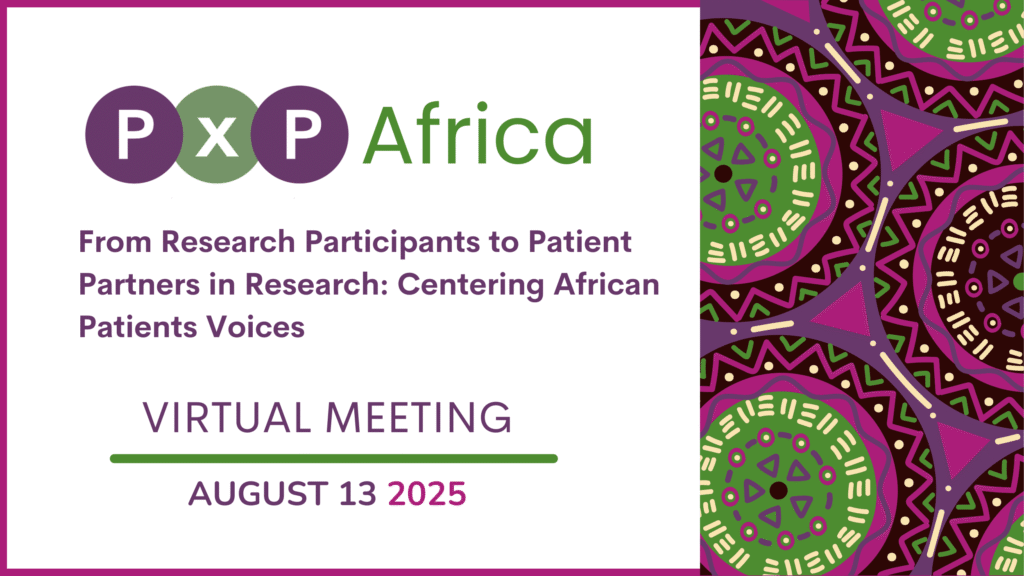The inaugural PxP Africa meeting was led by Joab Wako and Kwanele Asante, who are also members of the steering committee for the 2025 PxP Global Conference. The incredible panel of speakers were Rosebud Ombura, Mbali Ngobese and Action Amos, and their biographies are available on the PxP Africa page ce sujet.
During the PxP Africa event, we were very grateful to the attendees for their excellent engagement with the session. This page is a summary of some of the conversations, resources and anonymised quotes that were shared by attendees in the Chat. We have collated everything here, so that people who were unable to join the session live can still have the opportunity to learn with and from their peers.
Please note that some of the quotes shared below have been attributed to one of the PxP Africa speakers, as these are words that attendees shared in the Chat which particularly resonated with them.
- There was a lot of discussion in the Chat on the importance of patients being included as research partners throughout the research process, which was also emphasised by all three speakers including the opening talk by Rosebud Ombura who said that we should “start with patients and end with patients”. Patients should be included from ‘Day 0’ before the research question has even been formed.
“Inclusivity. Start with patients and end with patients. How can anyone know what a patient needs better than the person with lived experience? Indeed.
”
"Real engagement means changing the architecture and not just the optics!!!" Indeed
"The research starts with everyone being on the table!!!"
“I would even argue that research starts when everyone gets to build the table together!”
- Mbali Ngobese spoke during the PxP Africa meeting about her experiences of not being heard by the healthcare systems. This resonated with many of the attendees who shared their own reflections of medical gaslighting and other systemic barriers in the healthcare systems.
“The power of listening can make the difference between life and death
I completely agree with you.”
“To be heard is to be seen!!”
“Science without compassion is just as dangerous as ignorance.” Mbali Ngobese
“Instead of someone listening to me, I am instead fighting against a crippled system just so that I can feel heard and seen. Thank you for your contribution and I would like end of by emphasising your point that science without compassion is dangerous and it is up to us to dismantle these systemic barriers.”
"Healing and research are not separate!!! They never were." ~ Mbali
- Attendees also reflected on the theme of tokenism in patient engagement. Speaker, Action Amos, shared his experiences of feeling like a tick box and how it is possible for patients to be engaged meaningfully or eve to lead the research projects themselves.
“Qualifying to do research work as lived experience. The script already written and you're involved to tick a box. Role evolved. Moved from being a participant to being an active contributor. Part of 23 studies and led 4. Wow
”
- Trust was a complicated theme, and is linked to the issues of tokenism described above. All three speakers touched on the importance of building trust, and Rosebud spoke about the need for meaningful, bi-directional exchanges between patients and researchers.
“Real patient partnership involves created a framework in which patient-partners feel safe to share their perspectives in a meaningful way (no tokenism).”
“Trust is built by having open conversation between researchers and parents and caregivers so that they understand each others goals, interests, and limitations.”
- Attendees discussed the impacts of research, and that research projects where patients are appropriately engaged (or leading) often lead to greater impact, particularly through policy.
“Research involving people with lived experience impacting policy change” ~ Amos
"Lived experience is not supplementary. It is central to producing research that is ethical and impactful!!" ~ Amos
- The meeting sparked several questions that would benefit from ongoing dialogue. Some examples are provided here:
“Thanks everyone for this informative session - how can we progress the healthcare system in Africa to value patient voices in research and make the process accessible to patients of varied demographic? - from experience this seems to be more difficult and it is such a vital tool in research!”
“How we can actually equip African Patients in particular to provide them with adequate skillsets to participate in patient research?”
“I think AI poses both an opportunity and a threat to involving patient partners from Africa in the global stage of research. I hope it goes into the right direction....”
- During the meeting, some attendees shared their reflections about the session in a poll. The word clouds below summarise their responses to ‘In a few sentences, what are you leaving with from this session — insights, reflections, or anything that resonated?’ And ‘What’s one word that captures how you’re feeling after this session?’


Resources shared in the Chat
- More information about the PxP Africa Meeting, including speaker biographies: https://pxphub.org/event/pxp-africa-2025/
- Hearing from people with lived experience: https://www.ncdipoverty.org/voices-for-pen-plus
- EUPATI (European Patients’ Academy on Therapeutic Innovation) training for patient advocates in drugs research and development: https://learning.eupati.eu/admin/tool/custompage/view.php?id=3
- Resources that certifies People living with Diabetes in research: https://www.innodia.org/what-we-offer/our-community-people-living-type-1-diabetes
- The patient partners at CIHR-IMHA (supporters of PxP) have also created some learning modules about patient engagement in health research: https://cihr-irsc.gc.ca/e/27297.html#a2
Mental Health Resources
- Kenyan Red Cross - 1199
- Life Line South Africa 24/7 Help Line
Toll Free SA - 0800 012 322
Important: It offers help in several SA languages. Some areas offer face-to face counselling
See their website for more services - www.lifelines.co.za
- Befrienders Worldwide
See their website for information - https://befrienders.org/
Use the website drop down menu to select your country and preferred language. Some countries offer face-to-face support
About them - Tele-counselling
Facts: Have helped 1,200, 000 people globally in past 12 months
Supported people in 193 countries
Help Centers - aid people in 44 languages


